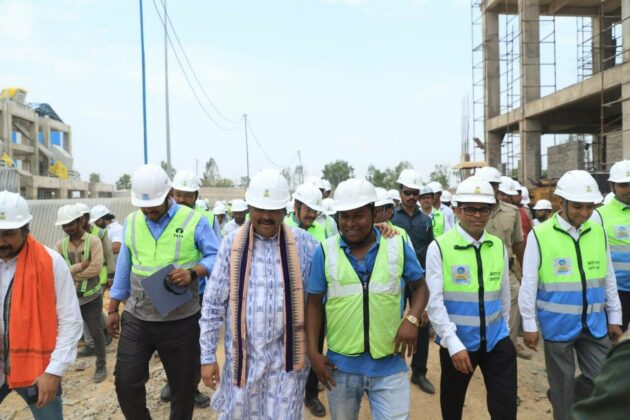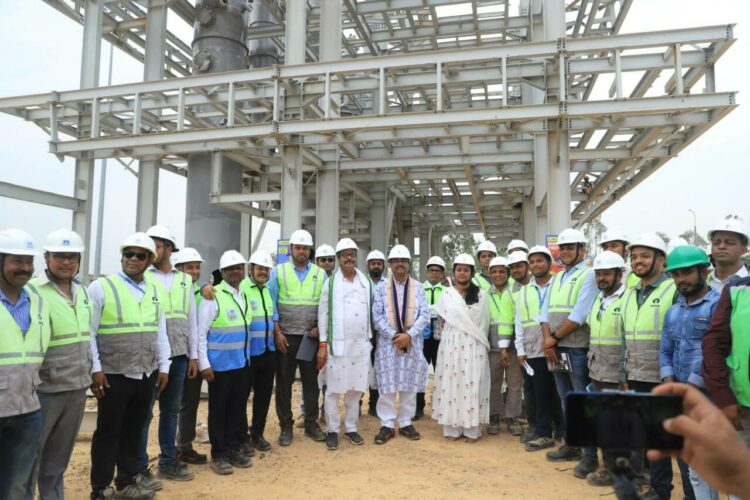The Union Minister of Skill Development and Entrepreneurship Dharmendra Pradhan said on June 11 that the first integrated 2G+1G ethanol bio-refinery plant at Bargarh district Odisha will “invigorate a circular economy” and “create large-scale employment”. He made these comments while visiting the bio-refinery site as part of the “Vikas Teerth Yatra” to mark nine years of the Modi government.
During the visit to the ongoing construction work at the bio-refinery project site, the Union Minister was accompanied by the MP of Bargarh Suresh Pujari and other dignitaries. He tweeted, “Bargarh Bio-refinery is making steady progress and is expected to be commissioned soon”. This plant will promote green biofuel.
The Union Minister said the refinery “will give momentum to green growth and sustainable development”. It will help generate employment and self-employment opportunities. It will also contribute to raising farmers’ income in the neighbouring areas, including Bargarh, Sambalpur, Sonepur, and Balangir.
He tweeted, “The Bargarh 2G bio-refinery will invigorate a circular economy, give impetus to waste-to-wealth creation, boost farmers income and welfare, create large-scale employment, augment indigenous production of green fuel and lead Odisha towards prosperity and self-reliance as envisioned by PM Narendra Modi”.

The Union Minister states that Bargarh district is an agrarian-based region. The primary source of the region’s economy lies in the cultivation of paddy and rice, but farmers need help with the disposal of their surplus produce. Currently, the farmers of Bargarh produce around 17 lakh tonnes of paddy, and from framing, around 15 lakh tonnes of straw is produced annually.
The biorefinery was decided to be built in the district by the Narendra Modi Government to address the issue of surplus produce and, at the same time, produce cost-effective green fuel. The refinery will produce ethanol from paddy straws and broken grains once the facility is operational. Ethanol will lessen environmental damage and provide financial gain to farmers because it is made from trash and subpar rice.
The Union Minister tweeted, “Keeping in mind GoI’s focus on #greengrowth and upcoming bio-refineries in Odisha and neighbouring Chattisgarh and West Bengal, suggested to design relevant courses & modules in ethanol engineering, economics & technology in regional Govt ITI for connecting local youth with the emerging green jobs and also prepare competent and skilled manpower”.
The project is the first integrated 2G+1G ethanol bio-refinery plant made by Bharat Petroleum Corporation Ltd (BPCL) will be using biomass from non-edible whole plants or food grain residues for 2G ethanol, and sugarcane juice, molasses & damaged grains for making 1G ethanol. This plant is located in Baulasingha village under Bhatli Tehsil in the western Odisha district of Bargarh. The project will be built with an estimated cost of around Rs 1,607 crore.
After developing ethanol from sugarcane, India is aiming towards the production of low-carbon fuel from grains and agricultural waste. This aim is part of an ambitious strategy to add ethanol to petrol in order to reduce emissions and the nation’s reliance on imports to meet its oil demands.
Currently, 10 per cent ethanol is blended into petrol (10 per cent ethanol, 90 per cent petrol), and by 2025 the volume is intended to be doubled. The Bargarh 2G bio-refinery is a part of the strategy to increase ethanol output in order to achieve the higher mixing goal.
After the bio-refinery plant becomes operational, it’s estimated that it will be able to produce around three crore litres of ethanol fuel each year by using rice straw as the feedstock. This ethanol manufactured by the plant will be mixed with petrol.



















Comments